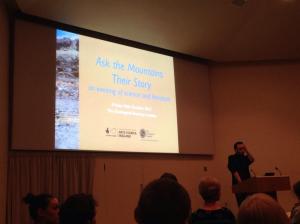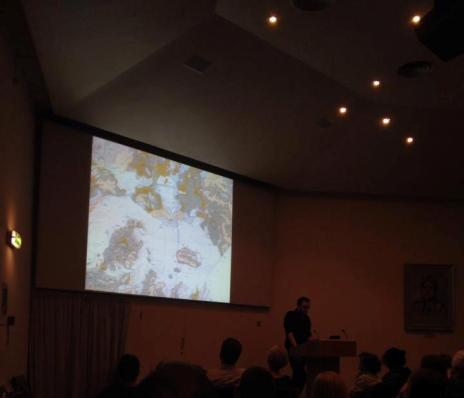On Friday 18th October it was a pleasure to host an evening of science and literature at the Geological Society in London called ‘Ask the Mountains Their Story’. I thought I’d post here the introductory text which I wrote for the programme.
WELCOME
This evening’s event marks the end of my year-long collaborative project with earth scientists, researching geology and climate change. In many ways, however, it is also the end of an idea which began two years ago at an event – Poetry and Geology: A Celebration – held in this very lecture theatre. On that occasion, Dr. Bryan Lovell, the instigator of that celebratory day, offered the audience the following challenge: ‘I hope that our poetry will help to establish true environmental conviction where our scientific prose has failed us’. With the assistance of an Arts Council Grant for the Arts award I took up that challenge in June 2012, joining geologists on field excursions, attending lectures and seminars, and keeping abreast of the literature on the subject through the resources of the Geological Society’s Library. The results are collected in the pamphlet Fossil Sunshine, available from Worple Press.
It’s been a year spent on beaches. In Yorkshire I stood amongst the ruins of tide defences and fallen double-yellow lines, looking at the slumped cliff coast of Holderness, and gathered Norwegian porphyry, Devil’s toenails, Baltic amber. In Margate I joined a troupe of geo-historians and lugged home a flint as polished and humanoid as a Henry Moore. In Dorset I read a poem on the cliff top to a slightly bemused crowd from the BP Institute; at the foot of that cliff, in Lulworth Cove, we rubbed our hands in oil sands and learned about the intricacies of horizontal drilling. And returning home, to the Antrim coast where I grew up, the coarse black basalts around the Giant’s Causeway took on a new significance, their forging having played a possible part in global warming 55 million years ago, the 55Ma Event which dumped a billion tonnes of carbon into the atmosphere.
What I have enjoyed is the practical creativity of geologists. Whether working through a problem on a raised beach, or calculating the volume of an imagined oil field, or mapping in their minds an invisible cliff, their creative approaches are ones that artists and writers should hope to emulate. They are unafraid to think of and design grand, sometimes terrifying, solutions to our climate challenge. Science backs them up, but it is imagination that gets them there.
I hope that my poems capture some of the creative verve exhibited by the scientists I met, that they are not afraid to ask difficult questions, and that they don’t presume to have the answers. To me they are a record of a year of discovery and are as various as my monthly obsessions: coastal erosion to oil pipelines to the Anthropocene to lab work to geo-engineering. While looking at instances of past climate change, it is human history and human characters that figure largely in the poems: human indifference and bloody-mindedness, human stoicism, but also human optimism and ability and ingenuity.
It is a pleasure to be joined this evening by three varied speakers: Sarah Day, whose The Space Between Us is a fictional account of 18th Century explorer Vitus Bering’s final expedition in the landscape of the frozen north; Barbara Cooke, whose biography Oil Men has been called ‘a vivid and absorbing piece of biography’ by former TLS editor Jeremy Treglown; and Bryan Lovell. I am delighted that Bryan has returned to talk about the science behind geology and climate change. Bryan is the firmest believer that cross-disciplinary action between arts and sciences is the best way to get the message of climate change across to a climate-fatigued public. It is encouraging, then, that this evening’s artistic intervention is one of many such projects existing up and down the country and throughout the world. And though it marks the end of my project, poetry can rarely be defined or confined by the imposition of time-scales. I hope there are more poems coming, as there is always urgent work to be done.
Michael McKimm, London, October 2013
YOU MIGHT ALSO LIKE
Ghosts of Gone Birds (Bloomsbury Publishing, 2013)
Featuring the work of more than 180 artists and writers, including Sarah Day, this book introduces the ideas behind a unique art and conservation project, providing a platform for the artists to tell us why they got involved, and how they approached the brief – to ‘breathe life back into the birds we have lost – so we don’t lose any more’.
Challenged by Carbon: the Oil Industry and Climate Change (Cambridge University Press, 2009)
‘Climate change fatigue is said to be an ailment slowly spreading through the media. Bryan Lovell’s lively new book — peering into the doubts, concerns and prejudices that have dogged climate negotiators — is an instant tonic for this malady.’– Nature
FIELD WORK Studio Eleven Gallery, Hull, and touring 2014
Six artists – painter, sculptors, graphic artist, silversmith and poet – respond to the geology of Flamborough Head, Yorkshire, in collaboration with the Flamborough Quaternary Research Group and Hull Geological Society. Artists include: Desmond Brett, Cath Keay, Anna Kirk-Smith, Michael McKimm, Jo Ray and Carlo Verda. For more information about the exhibition, its tour dates and locations, and events and activities surrounding it, contact michael.mckimm@geolsoc.org.uk
The Anthropocene Project 2013 / 2014
The ‘Anthropocene’ is the new geological ‘age of mankind’ as proposed by the Earth sciences. The transdisciplinary Anthropocene Project explores this concept, using research and presentation methods from the arts and sciences. www.hkw.de/anthropocene
ADRIFT
City poet Tom Chivers sets out to explore climate as culture, mapping out the territory of climate science within urban space. ADRIFT is a project from Cape Farewell, an organisation that pioneers the cultural response to climate change. whatisadrift.tumbler.com
Climate change: evidence from the geological record
The geological record contains abundant evidence of the ways in which Earth’s climate has changed in the past. That evidence is highly relevant to understanding how it may change in the future. www.geolsoc.org.uk/climatechange
Imagine2020: Art and Climate Change
IMAGINE2020 are eleven European performing arts venues and festivals who support artistic work that explores causes and effects of climate change. www.imagine2020.eu



